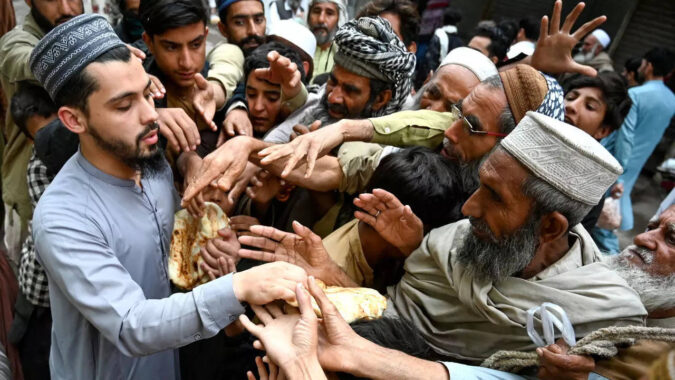In the last few weeks, Pakistan’s economy has gone from bad to worse due to mounting debt, depleting forex reserves and rising food prices.
Videos and pictures of Pakistan’s poor jostling to get just a handful of flour, and some even losing their lives in the ensuing stampedes give a horrific glimpse into the economic mess the country is currently navigating through.
To arrest the crisis, Pakistan’s central bank on Tuesday raised its key interest rate by 100 basis points to a record 21% on Tuesday.
The Pakistan rupee is already at 287.29 against the dollar, its lowest ever level, depreciating more than 20% since the start of the year.
The inflation soared to a record 35% last month. Food inflation in March was at 47.1% and 50.2% for urban and rural areas respectively.
And the worst is yet to come, warned the government, with energy tariff increasing and food prices rising due to the holy month of Ramzan.
Reports of dozens of Pakistani people getting injured or losing their lives in stampedes for food have made headlines across the world.
Take this dreadful first person account reported by Reuters.
A seven-year-old kid who had joined a crowd in a poor neighbourhood in Karachi to get a handout of flour and a little cash from a charity lost his life when a melee broke out.
He was among the 11, all women and children, who were killed in the latest in a series of deadly scrambles for food.
Last week, in another incident, police fired tear gas in a bid to control a frenzied crowd trying to get their hands on food supplies at a site in Khyber Pakhtunkhwa province.
In all, 16 people have been killed in chaos at charity distributions, shocking Pakistan, especially during the holy month of fasting, a time for giving and spiritual reflection.
But this year, economic malaise seems to be eroding society’s ability to cope.
As global factors have compounded consumer inflation, the country of 220 million people is struggling to finalise a bailout agreement with the International Monetary Fund (IMF).
The turmoil as charities try to help the poorest lays bare the desperation that is likely to get worse as the impact of inflation is compounded by smaller donations of the traditional zakat alms for the poor, according to five aid groups that Reuters spoke to.
“People that would donate small amounts are now showing up asking for help while people that used to donate large amounts are saying they’re struggling and scaling back,” Ansar Burney, head of the Ansar Burney Trust told Reuters.
“There has been a 50% reduction in donations this year, while there has been a 50% increase in people seeking help.”
‘Donor fatigue’
With prices rising, the funds that donors are giving are not stretching as far as they did.
“Charities are struggling to deal with rising inflation and costs the same way households are. There has also been a rise in the number of people heading our way for help,” said Ramzan Chhipa, founder of the Chhipa welfare association.
Higher fuel prices make providing an ambulance service ever more difficult, says Faisal Edhi, a philanthropist and chief of Pakistan’s largest charity operation the Edhi Foundation. The group’s ambulances took away the injured and the bodies of Saad and the others killed in the Karachi crush.
“Our services are becoming costly and we aren’t always able to reach the people … We’ve already spent a substantial amount from our reserves,” Edhi said.
Edhi said there had also been an increasing number of men committing suicide because they could not support their families, including one man who was a friend of his.
The Saylani Welfare Trust runs soup kitchens in Karachi’s poorest neighbourhoods where surging numbers of people are hoping for a meal but donations to fund the service are falling.
Trustee Arif Lakhani said where in the past up to 500 people would turn up, now it is up to 1,000 while donations have fallen by about half.
‘Famine-like situation’
A battered economy due to low forex reserves and with consequences of a massive flood to deal with, authorities in Pakistan are finding it increasingly difficult to fulfill the basic food requirements of the citizenry.
The price of ordinary snacks like samosa and pakoras are so high that poor people, who once relied on them for filling up their stomachs after fasting, have to make do with leftovers in shops, as per local news reports.
“The way inflation is rising, I believe a famine-like situation has been simmering,” said Shahida Wizarat, a Karachi-based analyst.
Authorities in Pakistan say the food crisis may grow worse in the coming days as much of the wheat in stock has been exhausted.
(With inputs from agencies)
